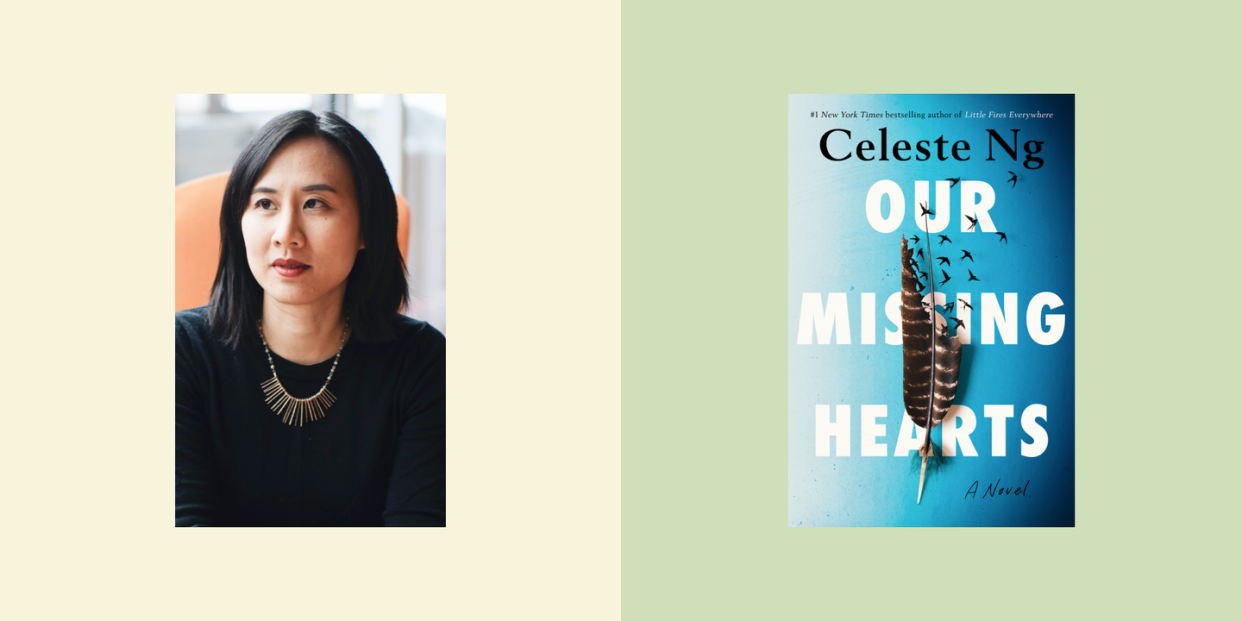Celeste Ng’s “Our Missing Hearts” Is a Timeless Depiction of Motherhood and Adolescence

- Oops!Something went wrong.Please try again later.
- Oops!Something went wrong.Please try again later.
Can storm clouds have silver linings? Celeste Ng’s politically charged Our Missing Hearts is a dark landscape on which anti-Asian hate, book bannings, family separation, and other forms of oppression rage. But the tale is also shot through with vivid color and rising hope, an unflinching yet life-affirming drama about the power of art and love to push back in dangerous times.
With two stellar prior novels, numerous short stories, and a Guggenheim Fellowship to her credit, Ng has quickly become a leading chronicler of modern American angst, race, and class. Her 2014 debut, Everything I Never Told You, topped best-books lists, and her second novel, the number one bestseller Little Fires Everywhere, made an even bigger cultural splash: It was turned into a much-talked-about Hulu series starring Reese Witherspoon and Kerry Washington.
Our Missing Hearts treads a similar line between literary fiction and social thriller, but this time with a more prominent political through line. It shares some literary DNA with The Handmaid’s Tale. In a near-future, quasi-dystopian, and increasingly authoritarian America, a 12-year-old nicknamed Bird goes on a quest for his mother, Margaret, who disappeared from his life without explanation three years prior. His father, Ethan—a former linguist now relegated to shelving books in a library—is broken, but not for the reasons Bird thinks. What’s really happened to Bird’s family and others is the novel’s central mystery.
In flashbacks, we learn who Bird’s parents were before him and how they fell so completely in love. When Margaret first met Ethan, she was a bike messenger and a poet. Though she had been raised to conform (according to her Chinese immigrant parents, “To be noticed was to invite predation; better to blend seamlessly into the foliage”), she’d thrown off that advice, moving to New York City, where “no one noticed you...Which meant you could do anything, be anything.”
As an adult, Margaret defied everything she’d been taught, resolving that “if the world was on fire, you might as well burn bright.” Ethan was her opposite: a cautious, squarish, white Midwesterner. He treasured and marveled at her, and she grew calm in his presence, loving the stillness and “the way he handled her, like butter to be licked off a finger.” When they were able to shut out the world together, poems came to Margaret “like timid animals emerging after a storm.” With days consumed by work and child-rearing, the life the couple crafted for themselves and Bird was a sanctuary even as turmoil propagated outside their doors. Margaret didn’t dwell on those external threats, though, preferring to focus on “her poems, her garden, her husband. Bird.” But after Margaret’s obscure volume of poetry, Our Missing Hearts, is taken up as a symbol and rallying cry against the government’s repressive actions—through no fault of her own—the family is shattered.
In the decade since his mother went missing, Bird has been taught to disavow her—to not draw attention to himself. Children of dissidents can be relocated under current laws and extreme measures taken to preserve “American culture.” But a cryptic letter Bird receives prompts a change in his perspective, and sparks a quest to reunite with his mother.
Ng’s portrait of an America roiled by instability and violence and racked by fear is one the author says she felt compelled to draw as real-world events began to intrude on her writing process. And while that portrait is a devastating one, Ng’s brilliance lies in leaving the reader with an unshakable belief that against all odds, people will find the courage to resist, revolt, and defend. Like many before her, Margaret is a reluctant but spectacular revolutionary. How her journey unfolds, and how that affects both Ethan and Bird, is at the beating heart of this remarkable novel, one that is as much paean to art and family as it is chilling cautionary tale.
You Might Also Like

